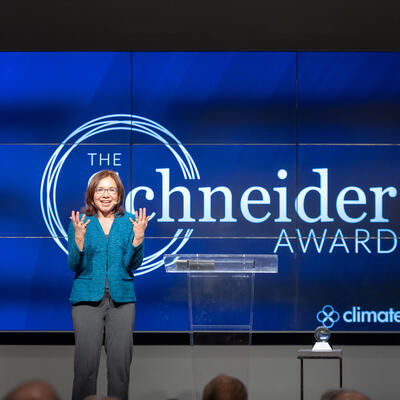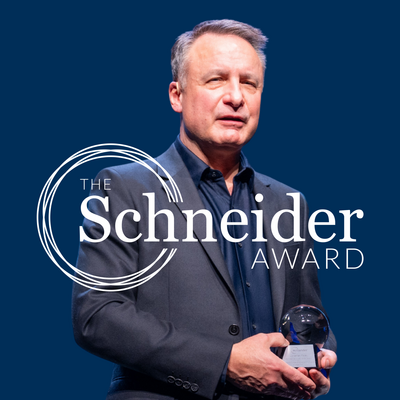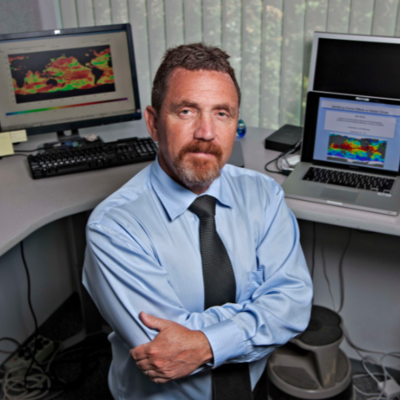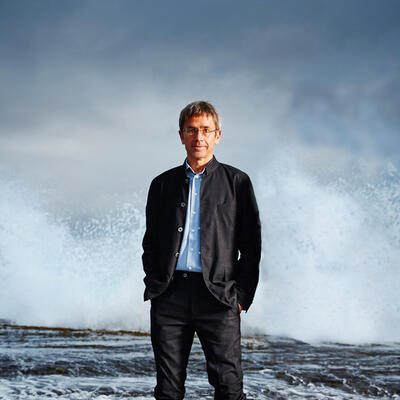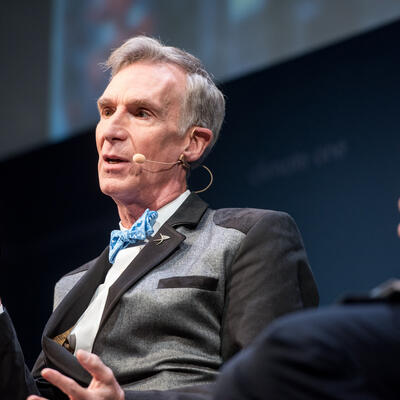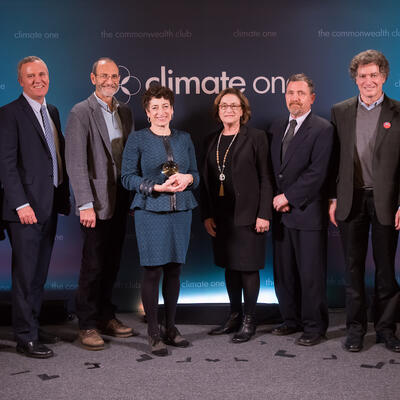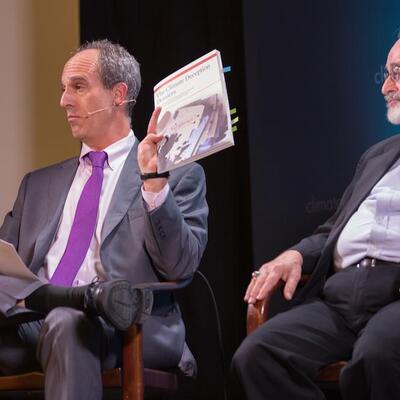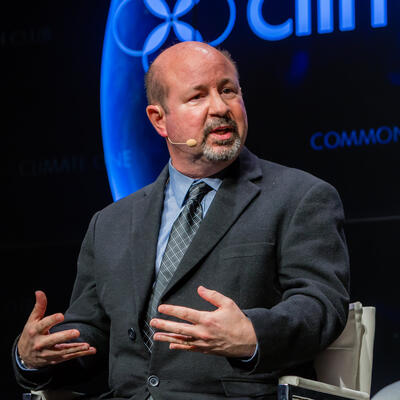
On the Ice with Michael Mann
Summary
The so-called hockey stick papers, published in 1999, ignited an assault on the science of climate change that still rages to this day. But lead author Michael Mann hasn’t backed off on his mission to educate the public on the science of global warming.
Mann was awarded the seventh annual Stephen H. Schneider Award for Outstanding Climate Science Communication, by Climate One.
Jonathan Foley, Executive Director, California Academy of Sciences
Dr. Michael Mann, Distinguished Professor of Atmospheric Science, Penn State University
This program was recorded in front of a live audience at The Commonwealth Club in San Francisco, CA on January 16, 2018.
Full Transcript
Announcer: This is Climate One, changing the conversation about energy, economy and the environment.
In 1998, a team of climate scientists published a paper showing global temperature records over the past one thousand years, illustrated by what has come to be known as the ‘hockey stick graph.’
Michael Mann: Little did I realize that with the publication of those papers whether I liked it or not I was gonna find myself at the center of this raging societal debate about climate change and what to do about it.
Announcer: That’s Dr. Michael Mann, one of the authors of the paper, and the recipient of this year’s Stephen Schneider award for Outstanding Climate Communication.
Following the publication of the report, Mann found himself under attack by climate change skeptics and conservative politicians bent on discrediting his work.
Michael Mann: If we could just find an email that would embarrass Mike Mann, then the entire weight of evidence for climate change would come crashing down like a house of cards.
Announcer: Climate wars – a view from the trenches. Up next on Climate One.
Announcer: How can a hockey stick help us understand the reality of global warming?
Welcome to Climate One – changing the conversation about America’s energy, economy and environment. Climate One conversations – with oil companies and environmentalists, Republicans and Democrats – are recorded before a live audience and hosted by Greg Dalton.
Picture a hockey stick lying on its side, with the blade on the right pointing up. That’s what a graph of the earth’s temperature over the past millennium looks like. Until about 1900, it’s essentially flat. Then it suddenly shoots up, right about the time of increased industrialization and the advent of fossil fuels. It’s a pretty undeniable illustration of how human activity has influenced global warming.
The so-called hockey stick papers, published in 1999, ignited an assault on the science of climate change that still rages to this day. But lead author Michael Mann hasn’t backed off on his mission to educate the public on the science of global warming.
Mann is a distinguished professor of Atmospheric Science at Penn State University and Director of the Earth System Science Center. He is also this year’s recipient of the Stephen Schneider Award for Outstanding Climate Science Communication presented by Climate One.
Our other guest today is Jonathan Foley, Executive Director of the California Academy of Sciences.
Here’s Greg Dalton, speaking first with Michael Mann.
Greg Dalton: Lot of scientists went into any kind of climate science or otherwise for the work and you started to become a public figure, which was not part of the bargain when you first went into it. And how did Steve Schneider help you with that public spotlight as part of the job?
Michael Mann: Yeah, and of course, Steve was one of the first scientists to find himself at the center of efforts to discredit science and to attack the science because Steve early on spoke out about the reality and the threat of climate change. And so I was fortunate enough to have folks like Steve who I could turn to for advice. And indeed when we published the hockey-stick papers in 1998, 1999, little did I realize that with the publication of those papers whether I liked it or not I was gonna find myself at the center of this raging societal debate about climate change and what to do about it.
And when the hockey-stick became this iconic graph in the climate change debate, I found myself at the very center of efforts to discredit the science in part by discrediting me personally. And I talked to Steve and he explained, look, you know what this means is that you're having an impact. Understand this isn't about you, understand that this is about you’re hurting their client, fossil fuel interests who are not happy about the implications of your science. And I think if it were not for that tutelage and that support, I'm not sure I would've made it through that period.
Greg Dalton: Around 2005, Joe Barton a Republican Congressman from Texas, where some hearings. Tell us about that, take us to that place and tell us that story.
Michael Mann: Barton back in 2005 as the chair of the House Energy and Commerce Committee sent essentially subpoena to me demanding all of my personal emails and all of my, you know, every scrap of paper, back of a napkin calculation that I ever did throughout my entire career based on the straw-man notion that it was our hockey-stick papers that formed the sole basis for concern about human influence on climate, which of course is absolutely silly. If there never was a hockey stick, if there never was the dozens of other studies that have come to the same conclusion as our hockey-stick paper. We would still have overwhelming evidence multiple lines of evidence that tell us that climate change is real and human caused and already a problem.
But because it was an iconic graph, it was easy to cynically sort of create the straw-man that the entire weight of evidence and the entire reason for concern was the hockey-stick graph. And if we could just find an email that would embarrass Mike Mann that would, you know, prove that in fact, he had, you know, invented this out of thin air, then the entire weight of evidence for climate change would come crashing down like a house of cards.
Of course it's ridiculous and it's cynical to believe that. But it was sort of part of this effort, if you could take an icon, be it polar bears in the Arctic discrediting the science there, Al Gore, making it seem like it's all just about Al Gore and his electricity bills, or the hockey-stick - if you can convince people that the entire weight of evidence depends on this one strand then it's a way to cynically try to sow doubt and confusion.
Greg Dalton: But Republicans came to your defense.
Michael Mann: Well that’s right. And if it were not for the fact that Sherwood Boehlert came out in our defense, and John McCain who co-authored an op-ed denouncing Joe Barton's witch hunt against me and my colleagues, if it were not for the fact that there were influential Republicans who came out at a time when Republicans controlled both houses of Congress and the presidency, if that hadn't happened, then who knows, you know, what we would been in store for. So it's important to realize that there are politicians of good faith on both sides of the aisle. I think it's something that we can hope we see more of in the years ahead. Because of course, we've seen the disappearance of that good faith in recent years.
Greg Dalton: These days the Trump administration is touting energy dominance for America. At a White House daily briefing Energy Secretary Rick Perry made the case for why that is important. Let’s listen.
[Start Clip]
Rick Perry: President Trump wants America to achieve energy dominance by utilizing our abundant resources for good, both here and abroad. And energy dominant America means self-reliant, means a secure nation free from the geopolitical turmoil of other nations who seek to use energy as an economic weapon. An energy dominant America will export to markets around the world, increasing our global leadership and our influence.
[End Clip]
Greg Dalton: That's Energy Secretary Rick Perry. John Foley, let's get you in on this. Secure resources, domestic resources to power the American economy sounds like a good idea. What’s wrong with that?
Jonathan Foley: Yeah, that sounds like a good idea. Just he wasn't pointing to the right sources, you know, like for example, wind and solar and things that work perfectly well and are actually cheaper than fossil fuels today. The market is speaking loudly that fossil fuels are going the way of their predecessors, the dinosaurs. And we have to, you know, invest for future technologies. That's where America can actually lead and that’s what we’re really talking about here. This isn’t about sacrificing some economic prosperity to solve the climate problem; it’s actually building a new economic prosperity that is actually grown in our communities in our own nation with our own technologies. That’s what we don’t get. I mean what Secretary Perry is really talking about is winding the clock back to old technologies that the rest of the world is leaving behind. And so we have a choice to make. Do we want to be left behind or do we want to be leading the global economy? And that’s the time to choose and he’s choosing the wrong one.
Greg Dalton: And at the institution you lead, the California Academy of Sciences, you've taken a step and even moving the institution and some of its investments away from those old, you know, fossil fuel resources. So tell about that and what impact and what consequences you had from divesting at the Cal Academy.
Jonathan Foley: Yeah, so we’re the only museum on earth I think that is fully divesting from fossil fuels. No other museum has announced that they’re doing this to my knowledge. And it wasn't without controversy but -- and we lost one major donor over it, which was kind of a bad day for me sometimes. We’re passing the hat around later if you like.
[Laughter]
But it was the right thing to do. And it wasn’t, you know, some of my board members at first said, you know, is this a political thing or not. I’m like, no, it’s just we are science institution this is something we should stand up for and more importantly public institution.
Greg Dalton: Michael Mann, we’ve seen what Centers for Disease Control have certain list that they can’t, science-based, et cetera. What impact does this sort of changing the language -- it’s one thing to sanitize government websites, it’s another thing to have kind of not quite burned books but banned phrases and words. What effect is that having in the scientific community?
Michael Mann: Well like John says, it’s not the explicit censorship that is the biggest problem here it’s the self-censorship that comes with that. When scientists think that if they mention terms like climate change, or sealevel rise in the abstracts of their proposals that the proposal, you know, a program manager who might want to do the right thing but who fears retribution from above may choose not to fund that proposal. They’re gonna have to defend it, they’re gonna have to defend it to their superiors, ultimately to political appointees and operatives. And so you get this sort of self-censorship where scientists themselves stop using the appropriate language to describe the research that they want to do. And, you know, pretty soon they're shying away from that research.
They're moving away from the research that they perceive as controversial. And what you lose is the sort of, you know, hard-hitting scientific research that's necessary if we are going to inform assessments of risk. I mean here we are talking about what is potentially the greatest threat that we face as a civilization and that's not just me and it’s not just scientist, that's our national security community telling us that this is an existential threat. And if we decide that we can no longer do research that informs the decision-making process and how we deal with that threat and how we become more resilient in the face of these challenges, everybody loses out, society loses out. As John said, we can’t afford to allow that to happen there’s too much at stake.
Greg Dalton: We don't know a lot about the budget; it’s always a moving target these days. Congress never seems to agree on a budget they just kind of kick it down for like a few weeks or months. But Michael Mann, we know if the funding to the National Science Foundation to the major scientific institution in this country, is the funding drying up is the resources drying up for the kinds of research that we need to have understand where this climate is going?
Michael Mann: Yeah right now we don’t have a budget we’re on continuing resolution so funding managers are afraid to commit new funds to fund science. And so first of all, just in this atmosphere of uncertainty where we don't have a science budget it’s very difficult for funding managers to make the longer-term decisions that they need to make about the funding of basic research. And of course there has been a threat on the part of the administration and congressional Republicans to substantially decrease funding specifically for climate change. In many cases, there has actually been an effort to defund sub areas of science that deals specifically with climate change, at the National Science Foundation, at NASA at NOAA, at the funding agencies, without realizing that once again it is, you know, their stakeholders. It is the insurance industry it is farmers, the agricultural industry. It is all of us who stand to lose out if we don't have reliable information to make decisions about, you know, basic decisions.
Greg Dalton: John Foley, there’s lots of talk about how cities and states can fill the gap. The policy void created by federal retreat or federal going in a different direction. But this is one area where cities and states don't have the billions of dollars that the federal government does. They can’t step in and fill that funding gap the way they can in other places. Is that fair?
Jonathan Foley: I think it’s fair definitely from the science point of view like there's no replacing the federal government in terms of investing in long-term R&D. The satellites we fly across the planet to monitor our environment, our climate, our weather. This matters when a hurricane is barreling towards your state by the way. I remember a story by Jane Lubchenco who used to be the head of NOAA when she was explaining to a Congressional member of Congress - I won’t say what party, you can guess. Why we needed to fund weather satellites, he looked at her and say we don’t need to pay for weather satellites, I just need to turn on the weather channel. A member of congress actually said that and not realizing of course, I hope you all know that the weather channel gets that data from NOAA satellites.
So this is undermining the investment in everything. But where I think cities and states can help lead though is perhaps on like renewable energy on energy efficiency, on buildings, building codes, transportation. A lot of those decisions on climate solutions actually are governed, sometimes even more at the local, state and county levels or by corporations or by multinationals.
So I think that, you know, there’s a very complex environment here, but science is getting hammered. And if we don't know what the problem is, it’s very hard to engineer a good solution to it.
Greg Dalton: Michael Mann, speaking of weather, you were boarding a plane one time and the pilot asked to speak to you. Tell us that.
Michael Mann: That's right. I thought I was in trouble.
Greg Dalton: Not because you are drunk and disorderly, no.
Michael Mann: No, the flight attendant came back and asked me “Are you Michael Mann?” And I didn’t know if I should answer yes or no. And the pilot had recognized me and wanted to talk with me. And in fact he was convinced that he is seeing the impact of climate change on aviation, on turbulence in the atmosphere. And he was quite informed, it turns out that he follows, you know, the climate literature in the blogs. And he knew sort of knew what he was talking about and he was absolutely convinced that he is seeing changes in sort of turbulence that are unusual in his career. And that he thinks are a manifestation of climate change. And it’s consistent with what we expect we do expect more turbulent energy in the atmosphere as it warms up.
And so to me that really drove home not just the fact that I have to be careful in what I do and say because people do actually recognize me now and then. But it really conveyed to me in a very profound way the fact that the impacts of climate change are no longer subtle. People are feeling them and seeing them in their daily lives and I think that's making a huge difference when we try to communicate to the science and its implications to the public. They sort of get it now at a level that I don't think they did in the past.
Greg Dalton: It's hitting every, yes, I said everything everywhere that we do and touch pretty much every day. Recently there's been a lot of talk about the extreme cold in the Eastern United States warm in the West, warm in the other parts of the world. So explain to us how that is related to climate change. We always hear this oh it's cold so climate change isn’t happening.
Michael Mann: Right. And it’s really a nuanced issue and of course when you talk about it, when you talk about the possibility that cold extremes could be impacted by climate change, the critics naturally say, oh look there they are. It doesn’t matter if it’s cold or it’s warm, they’re blaming everything on climate change. And in fact I sort of walked into that a bit when I wrote a blog about the extreme winter weather and the role that climate change might be having. And Al Gore tweeted a link to my piece and of course then the feeding frenzy ensued. And it is, you know, it does require you to get into some nuances. And it’s so difficult in today’s media environment to have nuance conversations about science.
But what it has to do with is the fact that something Californians are very familiar with this ridiculously resilient ridge; many of you have heard this term this tendency for high pressure over the West Coast California in the winter that's been forcing the storms northward, denying the rainfall and the snowfall that California relies upon for its water resources. Giving us, you know, a warm weather, which can seem nice but it also means that California isn't getting the rainfall that it needs. And that particular pattern of the jet stream has become more prevalent in recent years. There is a colleague of ours Noah Diffenbaugh at Stanford University who has done some really good research looking at how climate change may be impacting that particular pattern of the jet stream, where the jet stream sort of veers north denying the West Coast of those storms and then crashes down in the East, giving us that extreme cold weather that we've been seeing. And there's an emerging body of evidence that sort of speaks to the issue of surprises, things that we didn't understand that we didn't know were in store.
We are learning that there are aspects of climate change that we didn't really understand that are leading to impacts that we would not have expected. And in this case, the dramatic decrease in sea ice in the Arctic Ocean may be impacting the behavior of the northern hemisphere jetstream. A good friend of mine Susan Joy Hassol likes to say that what happens in the Arctic doesn't stay in the Arctic. And clearly we are seeing that the decrease in Arctic sea ice that might seem distant and we might think that, you know, it impacts nobody but polar bears and we might think that it can be dismissed, may be impacting weather down here in California along the East Coast of the U.S. Once again, in a way that isn't subtle in a way that's pretty profound in a way that we’re actually feeling and seeing.
Greg Dalton: John Foley, how is this gonna affect food production and other things?
Jonathan Foley: In terms of food production I mean the climate is intimately connected to everything we do whether it’s our food or our water or even our energy systems and our health. But approximately right to food, I mean, yeah, we’re seeing increasing problems with food production as the world’s population and diets become more and more demanding for food production.
And a lot of it has been caused by climate instability or long-term climate change just at a point when we can’t afford that. So for the first time in a long time the number of hungry people has been going up again which is kind of reversing a lot of progress we’ve been making. So it's not an immediate, you know, all out emergency, but it's something that we need to really, really watch, especially among the most vulnerable people. There are about 800 million people in the world right now who are food insecure, which mainly means they don't have the economic ability to go out in the market and get the food they need. But those are the people who always suffer first. And that’s the incredible irony of this; it’s the global rich, people like ourselves who are emitting the gases are causing most of this problem, but it's always the global poor, even in our own country but of course across the world they are always paying the price first. And that's really why this is ultimately really a moral dilemma just as much as a scientific and engineering one.
Announcer: We’re speaking today with Jonathan Foley, Executive Director of the California Academy of Scientists, and climatologist Michael Mann, winner of this year’s Stephen Schneider Award. We’ll continue the conversation right after this. This is Climate One.
Announcer: Welcome back to Climate One. Our guests today are Michael Mann, Distinguished Professor of Atmospheric Science at Penn State University, and Jonathan Foley of the California Academy of Sciences.
Here’s Greg Dalton.
Greg Dalton: One of the recent impacts that have been in the news a lot is fires. So Michael Mann, how are California fires or fires anywhere in the American West connected to climate?
Michael Mann: Well it’s not rocket science, right. Hot weather evaporates the moisture you have. Dry winters, little rainfall, little snowfall. You don't have that snow melt in the spring. Those factors come together with, you know, the effect of warmer winters, allowing pests like pine bark beetles to move into regions that they hadn't inhabited before. We’re seeing all these things come together and forgive the use of expression, a perfect storm of consequences for wildfire in the western U.S. We've seen I believe a near tripling of the extent of wildfire over the last 30 years and there is a strong climate change signal in that. We’re seeing one of the unfortunate and more subtle consequences of that. Drier summers, longer dry seasons may be associated with punctuated periods of very high rainfall a warmer atmosphere holds more moisture.
When the rain does fall, it falls in heavier amounts in which playing out what has been playing out over the last week in Southern California where the drought and the wildfire destroyed the vegetation that created conditions that were ripe for these landslides as we saw this very heavy rainfall last week.
Greg Dalton: John Foley, you talked about the impacts on poor people and for the people who are hit first and worst contributed least to this. Can you think of a time when you were moved to tears by seeing a climate impact or thinking about a climate impact?
Jonathan Foley: That’s a really interesting story. I think it’s one that scientists need to tell more often as why they do the work that they do. Maybe I'm kind of going around your question but one of the things I think so important is when we are in this kind of war on science, I hate to use that word but there seems to be one. Scientists often think we’re in a fact battle but we’re not. We’re in the battle of symbols and narrative. They wanted to destroy you and your symbol of the hockey stick because it was a powerful part of the narrative. And to counter that I think we have to as scientists embrace the humanity of this until a counter narrative that says wait this is about real people, people you love people you care about. It's about issues of fairness and safety and security.
And yeah, it's just absolutely heartbreaking to see some of the disasters that are befalling the planet whether some climate change, or deforestation or so many these links to global environmental problems. Yeah it hits me very, very hard personally to think that we’re gonna be the first generation in history to leave the next generation a planet that’s worse off and a society that’s worse off. And we’re doing it deliberately, because we knew better. We were told. We are told for 50 years, so this is an issue and we just chose to ignore it. So we have to do better.
Greg Dalton: Michael Mann, scientists are trained to speak from their heads rationally, dispassionately, not emotionally, that’s, uh-oh, not scientific. Was there a time you’ve been moved to tears or you kind of connect with your heart on this issue, rather than the cerebral part of it?
Michael Mann: Yeah there have been in numerous times. And sometimes it sort of hits you in a way that’s very unexpected, you don’t see it coming. And just everything comes together all of a sudden, you know, you spent so much time dealing with sort of the down in the trenches science of analyzing model output and looking at observations. And every once in a while it all comes together and you realize this isn't just a theoretical problem. This isn't just an effort to communicate science to the public. What we’re talking about as John said is the threat of leaving behind a fundamentally degraded planet for our children and grandchildren, I mean how horrible would it be to know that that was our legacy. And I have a 12-year-old daughter and there are times when it just all comes together and I realize that it's about her and it's about her children and what sort of planet are they going to inherit from us. We still have the opportunity to make sure that we don't leave behind a degraded planet for future generations but the window of time, the window of opportunity that we have to do that is shrinking.
Greg Dalton: If you’re just joining us this is Climate One and that’s Michael Mann, is a professor at Penn State University. We also have John Foley who is head of the California Academy of Sciences. I'm Greg Dalton.
And we’re gonna go to our lightning round where we ask quick questions or quick answers of our guests today. The first part is I will mention a name or a phrase and ask for the first thing that pops into your mind unfiltered and with complete disregard for what anyone will think about it. Michael Mann, President Trump’s White House science advisor.
Michael Mann: Nonexistent.
Greg Dalton: John Foley. Exxon Mobil?
Jonathan Foley: Complicated. Yeah.
Greg Dalton: John Foley, offshore oil drilling.
Jonathan Foley: Not a good idea.
Greg Dalton: Okay. This is true or false. Michael Mann, true or false. The biggest heroes in your personal story are Republican?
Michael Mann: True.
Greg Dalton: John Foley. Many foods you love will be more expensive because of climate disruption?
Jonathan Foley: Absolutely true.
Greg Dalton: Michael Mann. Sometimes you censor yourself when talking to friends about climate change impacts because you don't think they really want to know the dark truth?
Michael Mann: No.
[Laughter]
Greg Dalton: John Foley. Your wealth and privilege will protect you from the worst impacts of climate disruption?
Jonathan Foley: Mine or -- I don’t think so. Yes.
Greg Dalton: John Foley, you sometimes feel guilty about that?
Jonathan Foley: Absolutely.
Greg Dalton: Michael Mann, true or false. You are currently suing the National Review and Competitive Enterprise Institute for defamation related to blog posts about you?
Michael Mann: That would be true.
Greg Dalton: True or false. Michael Mann, you can summon empathy for a person working in a coal mine or on an oil rig to support their family?
Jonathan Foley: Absolutely.
Greg Dalton: Last one, John Foley. The climate would be healthier if more 50-year-old white guys talk about it on stage and on radio?
[Laughter]
Jonathan Foley: I guess we'll see.
Greg Dalton: Alright. That ends our lightning round. Let’s give them a round for getting through that.
[Applause]
Greg Dalton: John Foley, we’ve been talking a lot about the physical sciences. Climate is a conversation anchored in chemistry and physics and the models the people like Mike Mann study. I'm interested in the cognitive sciences, and whether the California Academy gets into that area about the science inside our head. Why aren’t we getting this responding to these flashing red warning lights and why we process information and threats in the way that we do?
Jonathan Foley: Well, I'm convinced we've really kind of blown most of the climate change story as an environmental community, as a scientific community. There’s a very common report a lot of you should go look at it if you haven’t seen it called the Six Americas report. Some of you are nodding. It’s really kind of amazing. It talks about there are six different kind of zeitgeist in America different groups of people essentially who react to climate change very differently. About 10% of Americans are vehemently, absolutely never going to believe this ever, ever, ever.
That’s only 10% and there's maybe 15% who are like oh my God, we’re all gonna die on this side over here. That leaves about in, you know, we’ll see. But that leaves about 75% of us in the middle who are just hiding under our desk right now hoping it'll go away. Because both sides are using fear as the message, whether it’s drowning polar bears in Al Gore's movies or Leonardo DiCaprio's movies. That isn’t helping; it's just showing negative images of how bad everything is without offering solutions. So I think we have to move from messages of fear to messages of hope. Not blind optimism but hope. Hope is where you roll up your sleeves and get to work.
And stop talking about the problem. If you haven't heard about the greenhouse effect by now, you're never gonna hear it anyway. So talk about solutions. We have all the solutions we need right now. People get very excited about that. And I think talk more about collaboration as opposed to competition. It's not about Republican versus Democrat or companies versus small town. It’s about a better future. And I don’t know about you but the team that’s working on this includes, you know, Pope Francis and Michael Bloomberg and Elon Musk, and Arnold Schwarzenegger and a lot of you. I wanna be on that team. So I don’t care what party you’re in. So I think we have to reframe the narrative to grab the middle.
Greg Dalton: Michael Mann, John Foley talked about how powerless people feel and a lot of the climate solutions are used to be change your light bulbs, change your diet. Do those things matter at all?
Michael Mann: I’m not an expert on this but I try to listen to what the experts have to say. You know, there are these sorts of no regrets things that we can do in our daily lives that make a little bit of a dent in the problem. And if everybody did them, it would make a bigger dent in the problem.
But they're also empowering. When you feel like you're doing something. I'm told by colleagues I have who are sort of are steeped and sort of the marketing and public relations side of the communication battle, and they’ll tell you that if you get people to do something that it can lead to greater actions. And pretty soon they're doing more than just changing their light bulbs, they’re writing letters to their Congress person. They’re getting out and voting, they’re holding their policymakers accountable for representing them in their concerns rather than the special interests who too often fund those campaigns. So I do think that it makes a difference, but ultimately if we are going to see the sorts of reductions that we need to see in carbon emissions, we’re going to need a price signal. We’re gonna need a price on carbon. We’re going to need a market mechanism to help steer the economy in the direction that it needs to go. And it’s already going, we’re already moving in that direction.
But if we’re going to avoid catastrophic warming, irreversible changes in climate, we’re gonna need to move there even faster. And that means that we do need to sort of put in place incentives to help the market move in the direction it's already moving, away from fossil fuels towards renewable energy. And, you know, we need policymakers who are willing to make the tough decisions and are willing to vote for, you know, climate policy. And we can only make that happen of course by showing up at the voting booth.
Greg Dalton: John Foley, how do you talk to climate skeptics?
Jonathan Foley: Well yeah, I’m related to some. Aren’t we all? So but I think, you know, you look at the 10% group and you’re like well, okay, you know, let’s talk about football. But there's a lot of the movable middle and I think again, you know, don't talk about the evidence or the facts or the climate science per se, as they've heard it before. In fact climate skeptics tend to be more informed about climate news and information than climate believers, on average, which just seems strange.
Greg Dalton: And highly intelligent.
Jonathan Foley: Yeah, actually yeah that is true. It’s just kind of strange. So it’s not a disbelief of numbers that's getting in the way. It's a cultural thing. It's really like I don't want the EPA regulating my pickup truck. That's what it is. You know it’s not about CO2 molecules or temperature graphs or even hockey sticks. That has nothing to do with it. It's about, it’s who has power.
If you notice the people who really are skeptical about climate change tend to be folks who disapprove of government exercising power over you. Whereas some people may be on the more liberal end of the spectrum really don't like vaccines and GMOs sometimes because they think it's the corporate control over you. So I think science gets caught in the middle sometimes over your distrust of power. And I think when you just kind of get to people directly and say wait a minute, like that pilot you met. Don't you believe your own eyes? Like isn’t this your everyday experience? I grew up in a really small town in rural Maine and people there know like the ice fishing isn’t what it used to be, or the maple syrup doesn't come what it used to or hunting I mean everybody knows. And so when you relate to people like that it kind of helps.
Greg Dalton: Michael Mann, does calling someone a denier make it harder for them to move away from that point of view and get out from underneath that denial label?
Michael Mann: So I think it's important to recognize that it's too easy to sort of end up blaming the victims. Many of those who do not accept the science of climate change are victims of a misinformation campaign of a disinformation campaign. And we should view them in that light. And, you know, those who are actively who are intentionally denying established science well I won’t call them a skeptic because, you know, all good scientists should be skeptics. Skepticism is a good thing in science. It's the self-correcting machinery of science that Carl Sagan talked about. And, you know, those who know better, who understand that there is overwhelming evidence but nonetheless are doing the bidding of special interests in trying to create to sow doubt and confusion, we can't call them skeptics and if they are denying basic science, then, you know, if the shoe fits.
What I find unfortunate, especially as somebody with Jewish ancestry -- I've heard the argument made by climate contrarians that this is an effort to somehow tar climate change contrarians with Holocaust denial by calling them, you know, climate change deniers.
And I actually find that offensive at some level. The argument that in some way, you know, I and my fellow climate scientist would be trying to belittle the atrocity of Nazi Germany when many of us know had family members who died in that atrocity.
No, it's actually a formal term you can actually go look at the science citation index. And in psychology, there's a field of denial and there are articles in leading scientific journals like Nature Climate Change that talk about climate change denial. It is a phenomenon.
So I do think that there's a danger. We’re balancing two things here. Sure some people will be offended by -- not being called skeptics. They want to think of themselves as skeptics. But if we call them skeptics if we allow them to sort of wear the mantle of scientific skepticism, if we allow them to present themselves as modern-day Galileos when they're anything but, it actually creates the notion among onlookers, among the public, that this is a credible position. That it is a defensible position that we should have a climate change contrarian on the stage with a climate scientist at an event like this.
Announcer: That’s Michael Mann, recipient of the seventh annual Stephen Schneider Award, presented by Climate One. We’ll be back with some questions from our audience, right after this.
Announcer: This is Climate One, changing the conversation about America’s energy, economy and environment. You can listen to all of our programs and subscribe to our podcast at our website: climate-one-dot-org.
Greg Dalton’s guests today are climatologist Michael Mann of Penn State University and Jonathan Foley, Executive Director of the California Academy of Sciences.
Greg Dalton: Let’s go to our audience questions. Welcome to Climate One.
Female Participant: Could you just go back to talking briefly about the satellites because my understanding is that the U.S. has decreased funding and therefore canceled some of the planned climate satellites. And if we’re not collecting that data is anybody else doing it?
Greg Dalton: Michael Mann.
Michael Mann: Well my friend, your Governor Jerry Brown was unable to make it to this event tonight. But I do remember him saying about a year ago when he heard that, you know, Donald Trump was gonna defund these climate satellites. And I've spoken to him enough to sort of I can actually do Jerry Brown a little bit. “We’ll put up our own damn satellites.”
[Laughter]
And, you know, and there are entrepreneurs; there was some talk about, you know, Silicon Valley, you know, tech millionaires and billionaires trying to step in. That still is on the table, the threat that we will discontinue, we will see discontinued certain essential modern monitoring satellites.
And as John said earlier, I think as politicians and stakeholders begin to understand that if we defund those satellites that that means we’re not going to have the capabilities the weather prediction capabilities that we used to have. That when we have a threatening Atlantic hurricane bearing down on the East Coast or the Gulf Coast of the US, we won't have the information that we need to make skillful forecasts of the trajectories of these storms. There’s a real cost that has nothing to do with climate change it has to do with basic capabilities, environmental prediction. I think as that discussion has proceeded we've seen some retreat from these early sort of threats to defund these satellite systems but, you know, we don't yet have an actual budget. And until we do, we don't know what the fate of these satellites actually are.
Greg Dalton: Let’s go to our next question. Welcome.
Male Participant: What do you see is the impact of -- how are we gonna get to our climate change goals if we don’t deal with overpopulation. My understanding is the carrying capacity of earth is 2 billion people with an undegraded ecosystem. How do you think we’re gonna do that?
Jonathan Foley: Yeah, I mean population is actually not really the biggest driver of our environmental problems around the world. It is driving the biggest number of recipients of environmental harm, of course are often areas are growing and population are very, very poor. But most of the damage is caused to the planet in terms of CO2 emissions, land-use, water use and so on are about 20% of the world’s population and it's the world's rich. So it’s like people like us are causing the damage but mostly it’s the world’s poor that are growing in number who receive the harm. So it's this kind of very complicated thing between our overuse of stuff and our bad kind of forms of technology and increasing number of vulnerable people in the world. It’s a wicked problem.
Greg Dalton: So population is not the driver, okay.
Jonathan Foley: Not at all. But it is the exacerbator of impact.
Greg Dalton: Next question. Welcome to Climate One.
Male Participant: Hi, my name is Patrick Grawdy from stopsprayingus.com. I was reading chapter 7 of your book on geoengineering, which is a very bad idea to resolve the climate crisis. Have you looked at all into the potential human health impacts?
Greg Dalton: Michael Mann. Explain what geoengineering is.
Michael Mann: Yes. So geoengineering is the intentional manipulation of essentially the global environment. And one might argue that climate change is sort of the unintentional massive global scale manipulation of our environment. It's an accidental geoengineering. The title of that chapter in our book by the way is “Geoengineering, or what could possibly go wrong?” So I think that perhaps betrays sort of my views in general about prospects for massive technological interventions with a system we don't understand perfectly. And there are ranges of schemes that have been proposed that range from shooting particles into the stratosphere to block out some of the sunlight and try to cool the earth back down. When you look at some of the potential side effects of that the unintended consequences it turns out that sort of scheme could actually end up leading to a drying out of the continents. You could cause some areas to actually warm even faster because of changing atmospheric circulation patterns. You would probably worsen acid rain and ozone depletion.
And as you go down the list with most of these proposed interventions, you know, the principle of unintended consequences really reigns supreme. And certainly health impacts are among those potential consequences. For example, the idea that we could fertilize the oceans by putting iron into the oceans fertilizing algae that would then take more of the CO2 out of the atmosphere. Well as those schemes have been studied more closely, it turns out first of all would probably just lead to faster cycling of carbon in the upper ocean. It wouldn’t take sort of carbon out of the system and it appears that that might actually favor the type of algae that give rise to red tides.
So, you know, there are potential health consequences. Again, it's the principle of unintended consequences interfering with a system that we don't understand perfectly. And there is no Planet B. The only one planet we know of in the universe right now that can support life.
Greg Dalton: And just to clarify. Geoengineering there’s maybe a few tests. It’s not happening now.
Michael Mann: No. There have been some local tests for example the algae iron fertilization. And these are sort of, uncontrolled, unauthorized experiments and that's one of the dangers here, that we could see these sorts of rogue efforts to engage in geoengineering. And so, you know, it is important to talk about it. Arguably, it is important to do the research, if for no other reason so we can understand what the consequences might actually be.
Greg Dalton: Let’s go to our next question for John Foley and Michael Mann at Climate One.
Male Participant: Hi, my name is Wayne Roth I'm an activist with 350.org
Dan Kammen I heard talked at an Actera event about three years ago and afterwards I talked with him, he used to run the Berkeley Sustainability Lab. I asked him, “What do you think that the global increase in temperature will be by 2100?” and he said “5 degrees Celsius.” So I wanna ask both of you. Given what we are not doing and all of the political problems we have and all of the denial and all of the difficulty even of people who care about the planet of actually making sacrifices and changes. What do you think the temperature increase will be by 2100 and what do you think that's gonna do to our planet. And could you give specifics.
Greg Dalton: Thank you. 5 degrees Celsius, Mike Mann, that’s pretty darn hot. We've had what about one degree so far from preindustrial warming.
Michael Mann: Well, as Niels Bohr once famously said predictions are hard especially about the future. So, you know, you're asking us to predict human behavior. Ultimately, if you're asking us to predict the temperature, you know, at the end of this century, then that involves physical science, it involves the climate model projections how much warming do you get for a certain increase in carbon emissions. But it's also asking us to predict human behavior and history is fraught with the efforts to predict human behavior. I would actually argue that the reasons for optimism that we've often been able to achieve far more than we would've thought, you know, the Apollo project, you know, when we set out to do something it’s amazing what we can accomplish as a civilization. And I actually think that we’re going to get our act in gear. There is some evidence that carbon emissions were starting to flatten; well then they went up a little bit last year we don't yet know if that was a temporary burp or if we we've come off that flattening.
But there is some evidence that we started to see that curve begin to bend downward. Now just bending the curve downward isn't enough. We've got to bring those emissions down to zero pretty quickly if we’re going to avert disastrous warming of the climate. And so that means we’ve got to improve substantially for example, on the commitments that were made at the Paris Accord. Paris gets us about halfway to where we need to be if we are going to hold warming below 2 degrees Celsius.
So if you’re gonna ask me, you know, what's the warming going to be by 2100, it's probably gonna be more than 2 degrees Celsius. But it's gonna be less a lot less than 5 degrees Celsius. We may miss the 2-degree exit on the -- the 2-degree off-ramp. But that doesn't mean we don't go for the 2.5-degree off-ramp. And if we missed that, we still go for the 3.0 off-ramp. We’re not gonna get to the 5-degree off-ramp. The real challenge right now is to see if we can keep warming below 2 degrees Celsius. It’s still within the realm of possibility, but it’s becoming a more and more uphill challenge with each year, where we don't quite meet the emissions goals we’d like to see.
Jonathan Foley: To quickly add to that. I’d ask you like what do you want it to be? It’s our agency as we get to decide this still. And the longer we wait the less decision space we have. But right now 2 to 5 is on the table, all of it. And 2 is where I want it or less is still theoretically possible. If you don’t believe me read Paul Hawken’s book “Drawdown” it outlines a hundred solutions to climate change that if we actually implemented half of them we’d be done. And a lot of them aren’t in energy; a lot of them are about our food, our forests, our refrigerants. It’s not just CO2 there’s lots of other things that are warming the atmosphere. So actually it’s a lot more human agency here then you hear about. And I’m kinda tired of, you know, that feeling helpless. We are absolutely not helpless. We absolutely can determine the future. So you decide what temperature the planet’s gonna be and then let’s get to work.
Greg Dalton: Michael Mann, as a professor you teach young students everyday. What gives you hope about we’re gonna keep to this lower end of the spectrum of warming that you and John Foley talked about?
Michael Mann: Yeah, well in part it is the students, it is the energy and the enthusiasm that I see come in to Penn State University every year when I teach my first-year seminar course. And it's a cultural transition that we’re undergoing right now. And, you know, younger folks get it; they understand that the decisions we’re making now about our energy infrastructure have long-term consequences for them and their children and their grandchildren. They’re not yet in a position to really influence policy at the highest level and so they need our help in the meantime. They need those of us who are in the midcareer stage to you know, do everything we can to make sure that we don't sacrifice those options in the meantime. They get it and when they're in charge we can be sure that the ship is going to be run properly. But we have to make sure that we don't steer it into the iceberg in the meantime.
And I'm optimistic because we are seeing a lot of progress. California is sort of a shining beacon for the rest of the country, demonstrating that you can both increase energy efficiency, lower carbon emissions incentivize renewables and electric vehicles and grow the economy at the same time. Really the only decision we have to make right now here in the U.S. is, are we going to get on board with the greatest revolution of the century, the clean energy revolution or are we gonna get left behind? That's the decision that we have to make. And I’m confident we’ll make the right one.
Greg Dalton: We’ve been talking about climate science and communication with Michael Mann, Professor of atmospheric science at Penn State and John Foley, Head of the California Academy of Sciences. Podcasts of this and other Climate One shows recorded with a live audience are available wherever you podcast. When you download one, please leave a comment or give us a rating. We want to know what you think about our conversations on food, energy, water, technology, and more. Thanks for joining us. We'll see you next time everybody.
[Applause]
Greg Dalton: Climate One is a project of The Commonwealth Club of California. Kelli Pennington directs our audience engagement. Carlos Manuel and Tyler Reed are our producers. The audio engineer is Mark Kirchner. Anny Celsi and Devon Strolovitch edit the show. The Commonwealth Club CEO is Dr. Gloria Duffy.
Climate One is presented in association with KQED Public Radio.
